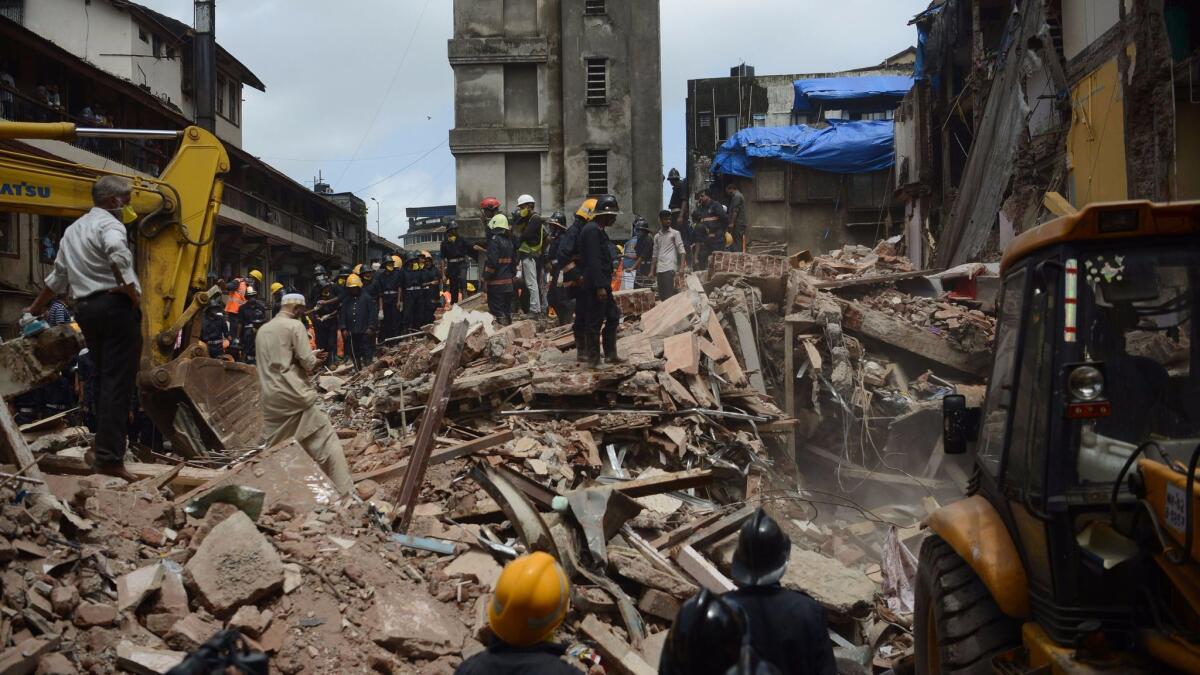At least 22 killed in building collapse in India as rain wreaks havoc across South Asia
- Share via
Reporting from MUMBAI, India — At least 22 people were killed and dozens injured Thursday when a 117-year-old apartment building collapsed in a densely populated area of India’s financial capital following two days of torrential rains, hospital officials said.
Rescue workers in Mumbai combed through the wreckage of the five-story Hussaini building, which state officials had declared unsafe six years ago, but where about 40 people were living, according to residents.
Indian news media said 28 people had been rescued from the rubble, but several others were still believed to be trapped, including laborers who worked on the ground floor and had reported for duty by 8:30 a.m., when the building began to buckle.
The building in the western Indian city’s crowded Bhendi Bazaar area also housed a nursery school, but the collapse occurred before children arrived, neighbors said.

“I could only see dust for a while,” said Hanif Panhalkar, 32, who lives in the building next door. “Once it settled, I ran to the spot. With the help of a few others, we got out four bodies stuck in the rubble. The authorities took over after that.”
It appeared that the building — which had been slated for redevelopment — was weakened by two days of monsoon rainfall that brought India’s financial capital to its knees, clogging roads, flooding homes and undermining the foundations of thousands of century-old buildings scattered across Mumbai.
By nightfall Thursday, fire brigades, police officers and construction vehicles occupied the street where the building stood. An excavator was at the site, sifting through mud, chunks of concrete and steel girders.
An elderly man emerged through the floodlights with a megaphone, asking people to make way. An ambulance zoomed past carrying a body just retrieved from the rubble, and a few people chased after it.
Across the street at a large public hospital, a list of the deceased was posted on a wall. Mohammad Salim Shah, 38, had arrived to claim the body of his younger brother, Haleem, 30, and Haleem’s nephew, Rizwan, 23.
Both men were sleeping on the ground floor, said Shah, who traveled from Mumbai’s northern suburbs when he got news of the collapse.
“I was praying all the way till I got here. But it was all in vain,” he said. Rizwan had been married in May, and it fell to Shah to break the news by phone to Rizwan’s wife, who lives in northern India.
“She could not stop bawling,” he said.
Other families held out hope that missing relatives could be found. At the hospital, Sayyed Manzar, 50, said he was waiting for news of his cousin Zafar. Thursday was Zafar’s birthday and his children had celebrated the night before with a cake, he said.
The bodies of the children — 14-year-old Fatima and 19-year-old Jama — and his wife Reshma had already been found and Manzar was called to identify them.
“It is traumatic,” he said. “I know the chances [that Zafar survived] are 1%, but I am hoping against hope. If his body is not yet found, maybe he is alive. Miracles do happen.”
Six years ago, the state housing authority had declared the building unsafe for habitation. A local charity group, the Saifee Burhani Upliftment Trust, said in a statement Thursday that it had begun moving tenants out of the apartment block in preparation for redevelopment.
The top official in Maharashtra state, Devendra Fadnavis, ordered an investigation into the incident and said the state would provide compensation for families of the dead.
The annual monsoon season from June to September routinely triggers floods, landslides and building collapses across South Asia, one of the world’s most densely populated regions, but this year’s rainfall has been among the deadliest in years.
The United Nations said last week that nearly 1,000 people had been killed and tens of thousands of homes, schools and businesses destroyed in India, Bangladesh and Nepal.
India was the hardest hit, with more than 600 deaths blamed on the rains and 32 million people affected, most across the north of the country, the United Nations said.
Officials in the Pakistani port city of Karachi said that at least 16 people had died there, mostly from electrocution, in heavy rains that flooded the city and caused walls to collapse.
Parth M.N. is a special correspondent.
ALSO:
As China and India tussle in South Asia, a pristine mountain kingdom is caught in the middle
Troubled Indian hospital says 217 children died there in August
UPDATES:
1:40 p.m.: This article was updated throughout with Los Angeles Times reporting and a higher death toll in Mumbai.
This article was originally published at 5:40 a.m.
More to Read
Sign up for Essential California
The most important California stories and recommendations in your inbox every morning.
You may occasionally receive promotional content from the Los Angeles Times.










